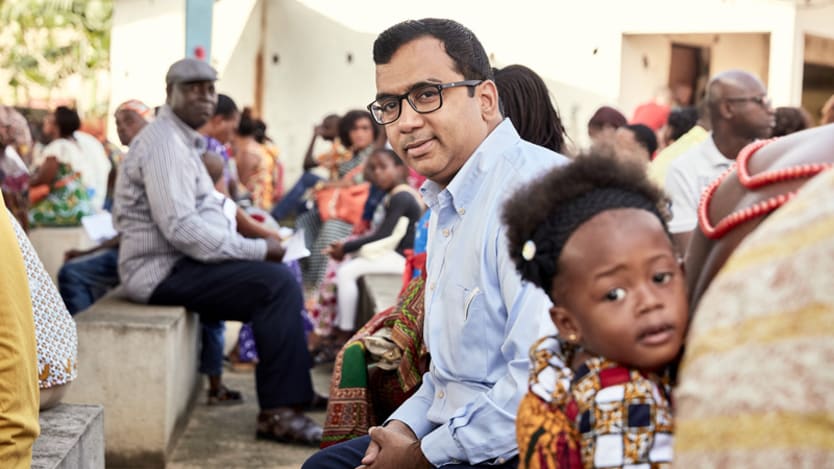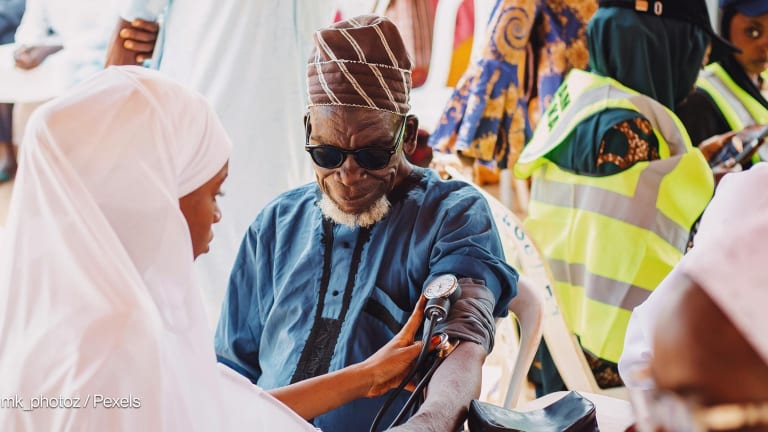
By 2030, the world aims to have reduced premature mortality from noncommunicable diseases by one third. Diabetes is one such NCD that, according to the World Health Organization, has been steadily increasing in prevalence since the 1980s, most aggressively in low- and middle-income countries. In fact, today, 15.5 million people in Africa are living with diabetes and this number is expected to increase to 40.7 million by 2045. To tackle diabetes and other NCDs, early detection policies, effective prevention processes, and access to affordable medicines are vital, along with collaboration across countries, sectors and stakeholders — an approach Novo Nordisk, a global health care company and the world’s largest supplier of insulin, firmly endorses.
How to improve access to NCD care
Addressing and reversing the increasing prevalence of noncommunicable diseases will require concerted government action, but that alone may not be enough. Devex explores the role of partnerships in tackling NCDs and asks how the private sector can join African countries on their journey toward universal health coverage.
“Our main strength is in the development of diabetes medicine, but we also know that we can’t do everything alone,” said Venkat Kalyan, Novo Nordisk’s general manager for the Middle Africa affiliate. “We have to be part of the solution — and that’s where we work with partners.”
Delving deeper into the topic, Kalyan explains how the company plans to drive forward the Sustainable Development Goals by ensuring affordable access to insulin across the continent, and shares lessons from its 50 years of Africa operations.
Below are highlights from the conversation, edited for length and clarity.
On a practical level, how is Novo Nordisk supporting the SDGs in its NCD work?
Novo Nordisk has been a leader in diabetes care and we take a very clear interest in the agenda for sustainable development. Our work is driven towards improving the health care sector and we are working towards the targets. Examples I can give are our three initiatives in Africa: One is the Changing Diabetes in Children program, the other one is the Base of the Pyramid project, and then there’s our Access to Insulin Commitment.
The World Diabetes Foundation is an independent trust dedicated to the prevention and treatment of diabetes in the developing world. Part of Novo Nordisk’s contribution to promoting access to care in developing countries is continued long-term financial commitment to WDF, which supports sustainable partnerships, and has so far done so in more than 115 countries.
The Changing Diabetes in Children program is about helping children with type 1 diabetes who need diabetes care daily to survive, also helping the diagnosis of these children and building some capacity for health care professionals treating the children. This was launched in 2009, and the initial objective was to reach around 10,000 children; that was further extended in 2015 to 20,000 children by the end of 2020. Sudan, Côte d'Ivoire, and Senegal are the three new countries it’s recently been launched in, and along with Tanzania, Kenya, Uganda, Ethiopia, Cameroon, Democratic Republic of Congo, and Guinea, in total it runs across 10 countries in Middle Africa.
The Base of the Pyramid project is about partnerships, encouraging shared responsibility between our partners, and in some cases the governments and local stakeholders. It currently runs in four countries: Kenya, Nigeria, Ghana, and Senegal. Ghana is an example where one of the partners is a health care authority that covers one-stop care and treatment and it has established several centers in the country since 2014. One-stop care means diabetes centers which are part of the existing hospitals. These centers offer a mini lab for doing diabetes tests, a dispensary, consultation, and patient education.
The Access to Insulin Commitment is about providing quality treatment and guaranteeing low price insulin to developing countries as a company. The AIC offers human insulin at a set price of maximum $4 per vial. Our guarantee applies to least developed countries as defined by the U.N. and other low- income countries as defined by the World Bank as well as selected organizations providing relief in humanitarian situations.
The African continent is facing a dramatic increase in diabetes, and pricing, access, and affordability are prominent challenges for pharmaceutical companies in markets around the world. What is Novo Nordisk doing to ensure equitable access to its products in Africa?
This has been a challenge in some of our countries, but it’s something that we’ve been working on for a long time. We are working on providing insulin at a low price in a list of countries as defined by the World Bank and to selected organizations. In fact, the BoP project is also aimed at ensuring the accessibility and affordability of insulin. In Ghana, for example, they are running the program and our objective is to provide a one-stop shop of quality medicines.
In some cases, there are also many other factors to consider apart from just the price of the product. In some parts of Africa, people spend even more money on transportation to the medical center than on the price of insulin. So it’s a multi-dimensional problem but Novo Nordisk is working very closely with partners, doctors, and associations to align with our policy to provide insulin at an accessible price in those countries. This in itself is innovative, in the sense that it seeks to reduce the number of middle men who all add on to the price.
We are also working with governments very closely. In Kenya, there’s a partnership with the Ministry of Health and various NGOs where thousands of people are now getting access to insulin at less than 45 percent of the price they used to pay just a few years back.
“Work with the community and local doctors in order to spread the right knowledge about insulin and also diabetes care.”
— Venkat Kalyan, general manager for the Middle Africa affiliate, Novo NordiskNovo Nordisk began operating in Africa in 1959, delivering various health care solutions, and distributing medicines. What main lessons have been learned that affect the way in which you work today?
My learnings from Novo Nordisk in Africa are to work with trusted partners. We need to work on the value chain in terms of the distribution of insulin, so it’s very important to work with high-quality minded partners and distributors, working to ensure the quality is maintained through the whole value chain.
Number two is to work with the community and local doctors in order to spread the right knowledge about insulin and also diabetes care. The projects I mentioned are also great learnings because they are running across 10 countries with different levels of success, so once again trying to take the successes of one country into another and overcome the challenges with the combined knowledge.
We also work very closely with local communities through diabetes study groups. In Ghana, we work with the community and in Nigeria and Lagos we work with civil society. It’s very important that local doctors are onboard and committed to the mission because they hold sway, and so we work with them to get the messages across. In that sense, we’re all working together in the region to ensure the best quality care for people with diabetes.
To find out more about how Novo Nordisk is tackling NCDs, read more about its work here.








